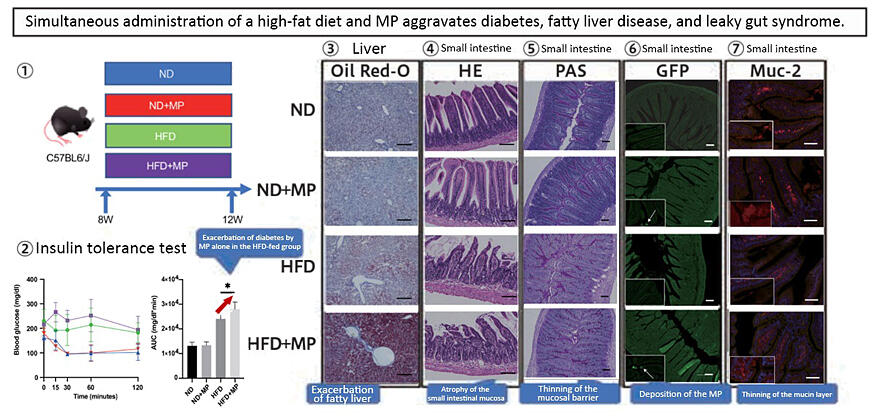"Microplastic" (MP) is a general term for fine plastic particles less than 5 mm in diameter. Environmental pollution is increasing because MPs do not decompose naturally and instead drifts in the oceans and atmosphere. The health effects of MPs have been of great concern in recent years. However, the mechanism through which they cause bodily damage has not been clarified because of insufficient evaluation from a toxicological perspective.
Focusing on "leaky gut syndrome," in which increased fat intake weakens the barrier function of the small intestine, allowing harmful substances such as bacteria to invade the body, a research group led by Professor Hirohisa Takano of the Graduate School of Global Environmental Studies, Kyoto University verified the mechanism through which MP causes disease development. In this study, wild‐type mice were divided into four groups: normal diet only, normal diet + MP, high‐fat diet only, and high‐fat diet + MP. All mice were administered their respective diet and treatment for four weeks, after which metabolic disturbances were evaluated. The results showed that the mice on the high‐fat diet had a highly permeable small intestine and fewer mucus‐secreting goblet cells than those on the normal diet. Furthermore, the blood glucose level, serum lipid concentration, and non‐alcoholic fatty liver disease activity score were higher in the high‐fat diet + MP group than in the normal diet + MP group. Additionally, it was found that the number of inflammatory cells in the small intestine was higher and that of anti‐inflammatory cells was lower in the high‐fat diet + MP group than in the high‐fat diet group.
These results suggest that the high‐fat diet‐induced leaky gut syndrome and MP deposition in the intestinal mucosa caused inflammation and altered nutrient absorption. This study is the first in the world to point out the need to reduce the oral intake of MP by reviewing the environmental aspects rather than just improving the metabolic disturbances under high‐fat diet conditions through medical measures alone.
Changes in blood glucose levels and metabolic functions in mice administered a high‐fat diet and microplastics (MP)





